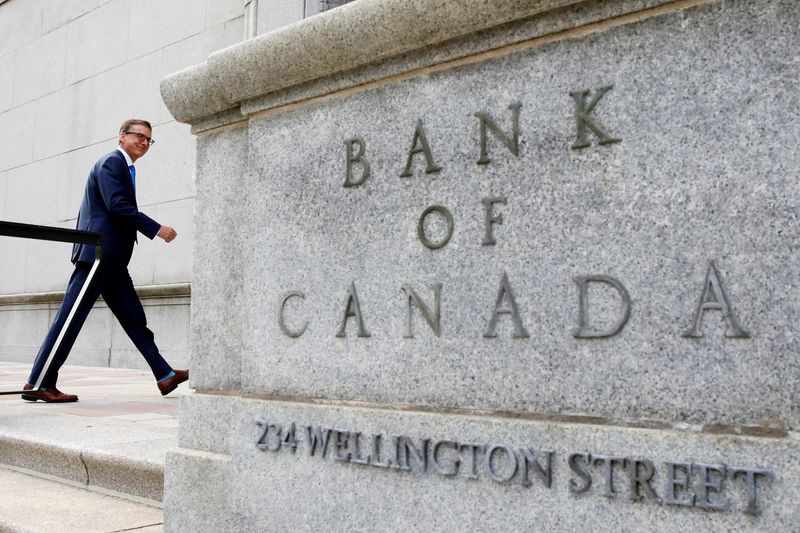LONDON (Reuters) – The European Central Bank delivered a second straight 75-basis-point interest rate hike on Thursday, the latest sign that major central banks are serious about curbing hot inflation.
Central banks in the 10 big developed economies have raised rates by a combined 2,165 basis points (bps) in this cycle to date, with Japan the holdout “dove.”
But the pace of these rate rises is starting to slow – Canada just delivered a smaller-than-anticipated rate hike.
Here’s a look at where policymakers stand from hawkish to dovish.
Central banks ramp up fight against inflation https://graphics.reuters.com/EUROZONE-MARKETS/zdvxdyxbwvx/chart.png
1) UNITED STATES
The Federal Reserve is widely expected to hike rates by 75 basis points at its policy meeting next week. That would be the fourth straight rate increase of that magnitude, bringing the policy rate to the 3.75%-4.00% range as part of what has been the sharpest set of U.S. rate increases in about 40 years.
Signs that the economy is weakening have fuelled speculation the Fed could soon slow its aggressive monetary tightening, pushing the dollar off recent two-decade highs.
Fed delivers another big hike https://graphics.reuters.com/USA-FED/zgpomogezpd/chart.png
2) CANADA
The Bank of Canada announced a smaller-than-expected rate hike on Wednesday and said it was getting closer to the end of its historic tightening campaign as it forecast the economy would stall in coming quarters.
It increased its policy rate by 50 basis points to 3.75%, coming up short on calls for another 75-basis-point move and has lifted rates by 350 basis points since March, one of its fastest tightening cycles ever.
Canada’s bid to tame inflation https://graphics.reuters.com/CANADA-CENBANK/movakmqzrva/chart.png
3) NEW ZEALAND
The Reserve Bank of New Zealand earlier this month delivered its eighth straight rate hike – and fifth consecutive rise of 50 basis points – to lift its policy rate to 3.50%, the highest in seven years.
The RBNZ even debated a larger 75-basis-point move, given intense price pressures.
New Zealand’s central bank is in the hawkish camp https://graphics.reuters.com/GLOBAL-CENTRALBANKS/akpezdnzevr/chart.png
4) BRITAIN
Traders anticipate a 75-basis-point rate increase from the Bank of England on Nov. 3 to tame inflation running at a 40-year high of 10.1%. In September, it hiked its policy rate by 50 basis points to 2.25%.
At one point last month, traders expected the policy rate to hit 3.75% by November. But following the cancellation of Liz Truss’s plans for unfunded tax cuts and her subsequent resignation as prime minister, expectations for such an outsized increase have fallen.
Bank of England under pressure https://graphics.reuters.com/BRITAIN-BOE/gkplwmleqvb/chart.png
5) NORWAY
Norway, the first big developed economy to kick off a rate-hiking cycle last year, saw its policy rate lifted by 50 basis points to 2.25% in September. Norges Bank, which said future increases would be more “gradual”, meets next Thursday.
Sustained hikes https://graphics.reuters.com/NORWAY-ECONOMY/RATES/lbvgnkkbwpq/chart.png
6) AUSTRALIA
The Reserve Bank of Australia delivered a smaller-than-anticipated 25-basis-point rate rise in October, saying it had raised rates substantially but adding that further tightening would be necessary.
Data this week showing Australian inflation raced to a 32-year high last quarter, however, has stoked pressure to return to a more aggressive stance.
The RBA has delivered 250 basis points of hikes, raising rates every month since May and pushing its key rate to a nine-year high of 2.60%.
RBA looks for a path back to inflation target https://graphics.reuters.com/GLOBAL-CENTRALBANKS/jnvweqlyxvw/chart.png
7) SWEDEN
Sweden’s central bank raised its key rate on Sept. 20 by a larger-than-expected one percentage point to 1.75%. The Riksbank, which will reveal its next rates decision on Nov. 24, warned of more to come over the next six months to contain surging inflation.
The rate hike last month was the biggest since the Riksbank adopted an inflation target in 1993 and equal in size to the hike in November 1992 when a domestic financial crisis pushed the main rate to 500% for a short period.
Riksbank hikes to control surging inflation https://graphics.reuters.com/GLOBAL-CENTRALBANKS/jnpwemdampw/chart.png
8) EURO ZONE
The ECB raised rates again on Thursday and signalled it was keen to start shrinking its bloated balance sheet, taking another big step in tightening policy to fight off an historic surge in inflation.
The ECB also cut a key subsidy to banks but made no hint about plans to start winding down its bond holdings after hoovering up trillions of euros of debt issued by euro zone governments since 2015.
ECB hikes policy rate by another 75bps https://graphics.reuters.com/GLOBAL-CENTRALBANKS/xmvjkgndjpr/chart.png
9) SWITZERLAND
The Swiss National Bank raised its policy rate in September by another 75 basis points to 0.5% from minus 0.25%, ending the negative rates experiment in Europe.
It next meets in December, and markets have priced in a 50-basis-point rate increase.
SNB exits negative rates era https://graphics.reuters.com/GLOBAL-CENTRALBANKS/zdpxommayvx/chart.png
10) JAPAN
The Bank of Japan, the lone policy dove among major central banks, has kept benchmark bond yields pinned near zero and is sticking to its dovish policy guidance.
The resulting, ever-widening gap between Japanese yields and those elsewhere has caused the yen to weaken sharply, leading to intervention from Japanese authorities to stabilise the currency. Policymakers say there is no contradiction between intervening in both currency and bond markets.
The BOJ meets on Friday and is expected to maintain its ultra-loose stance.
Bank of Japan leaves rates unchanged https://graphics.reuters.com/GLOBAL-CENTRALBANKS/zjvqkrrdmvx/chart.png
(Reporting by Yoruk Bahceli, Samuel Indyk, Nell Mackenzie, Dhara Ranasinghe, Alun John and Harry Robertson; Graphics by Vincent Flasseur, Sumanta Sen and Pasit Kongkunakornkul, Editing by Paul Simao)

